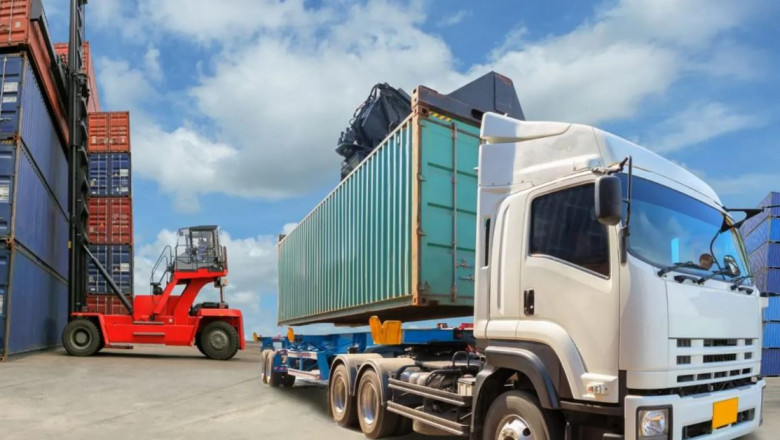views
In the complex world of transportation and supply chains, understanding the difference between freight and logistics management is essential. While these two terms are often used together, they serve different purposes within business operations.
Freight focuses on the actual movement of goods, while logistics management encompasses the broader planning and coordination behind that movement. By exploring how these two areas differ and work together, businesses can develop smarter strategies to streamline operations and improve profitability.
What Is Freight
Freight refers specifically to the goods being transported from one place to another, usually for commercial purposes. Freight includes products, materials, or commodities moved by various modes of transportation such as truck, ship, train, or airplane.
Managing freight involves booking shipments, selecting the appropriate transportation method, and ensuring that goods reach their destination safely and on time. Freight is the physical part of the supply chain that moves products into markets and customers’ hands.
What Is Logistics Management
Logistics management, by contrast, refers to the strategic planning, execution, and oversight of the entire supply chain process. It covers everything from sourcing raw materials to manufacturing, warehousing, inventory control, freight coordination, and final delivery.
Logistics management ensures that freight is moved efficiently but also that it aligns with business goals, cost objectives, and customer expectations. Good logistics management leads to lower operating costs, faster delivery times, and stronger customer satisfaction.
How Trucking Companies Handle Freight Operations
Trucking companies are vital players in freight transportation. They move goods across highways, cities, and regions, ensuring that products reach warehouses, distribution centers, retailers, and customers.
Trucking companies focus on the physical transportation of freight, using their fleets, drivers, and logistics systems to ensure on-time deliveries. By partnering with trusted trucking providers, businesses secure consistent, reliable freight movement critical to supply chain success.
Freight Forwarders and Logistics Management
Freight forwarding services operate at the intersection of freight transportation and logistics management. Freight forwarders manage the documentation, customs clearance, carrier coordination, and risk management necessary to move goods internationally.
While freight forwarders are involved in moving cargo, they also provide strategic logistics services, helping businesses plan shipping routes, navigate regulatory challenges, and ensure that their supply chains function smoothly on a global scale.
Different Freight Types in Logistics
In logistics management, it is essential to understand the types of freight that are best suited for different shipping needs. Full truckload freight is used when a business needs an entire truck for a single shipment, while less-than-truckload shipments combine cargo from multiple businesses to save costs.
Specialized types of freight, such as refrigerated freight, hazardous materials, or oversized goods, require specific handling protocols. Logistics managers make strategic decisions about which freight types to use to balance costs, delivery speed, and cargo safety.
The Role of Flatbed Trucking in Freight Movement
Certain types of freight require flatbed trucking services for safe transportation. Oversized machinery, construction materials, and agricultural equipment often cannot fit into enclosed trailers. Flatbed trucks provide the flexibility needed for loading and securing large or irregularly shaped cargo. Logistics management ensures that the right trucking solutions are selected based on the cargo’s size, weight, and destination requirements, minimizing risks and transportation delays.
Strategic Planning in Logistics Management
Unlike freight handling, which focuses mainly on movement, logistics management emphasizes strategic planning. It involves forecasting demand, optimizing transportation routes, selecting the best carriers, planning warehouse layouts, and managing inventory. Effective logistics management also includes contingency planning to mitigate risks like transportation disruptions or supply chain bottlenecks. A strategic approach ensures that freight movements align with broader business goals and customer service standards.
Technology’s Role in Modern Logistics
Technology has significantly enhanced logistics management. Real-time tracking, automated inventory systems, AI-powered forecasting tools, and transportation management systems allow businesses to monitor shipments, optimize warehouse operations, and predict customer needs. These innovations not only improve the handling of freight but also support logistics managers in making informed decisions that enhance the overall supply chain’s efficiency and resilience.
Freight Costs Versus Total Logistics Costs
Another major difference between freight and logistics management lies in cost considerations. Freight costs include the direct expenses related to moving goods from one point to another, such as transportation charges, fuel surcharges, and handling fees. Logistics costs, however, are broader and include warehousing, inventory holding, packaging, order fulfillment, and technology expenses. Successful businesses manage both freight and logistics costs to maximize profitability while maintaining service quality.
Conclusion: Freight and Logistics Management Are Interconnected but Different
Freight and logistics management are two sides of the same coin. Freight focuses on the physical movement of goods, while logistics management covers the planning and coordination that make that movement possible and efficient. By understanding and optimizing both, businesses create stronger, more resilient supply chains. Partnering with reliable trucking companies, leveraging experienced freight forwarding services, selecting the right types of freight, and using specialized flatbed trucking services when necessary are crucial steps toward achieving logistics excellence and competitive advantage.
FAQs About Freight and Logistics Management
What is the main difference between freight and logistics management?
Freight refers to the physical transportation of goods, while logistics management focuses on the broader planning, coordination, and execution of supply chain operations.
How do trucking companies fit into freight operations?
Trucking companies handle the transportation of freight, ensuring goods move safely and efficiently across local, regional, and national routes.
What services do freight forwarding companies offer?
Freight forwarding services manage international shipping logistics, including customs clearance, carrier coordination, and risk management.
Why is understanding types of freight important in logistics?
Choosing the right types of freight ensures efficient, cost-effective, and safe transportation based on shipment size, destination, and product requirements.
When are flatbed trucking services used in logistics management?
Flatbed trucking services are used for transporting oversized, heavy, or irregular cargo that cannot fit into standard enclosed trailers.














Comments
0 comment